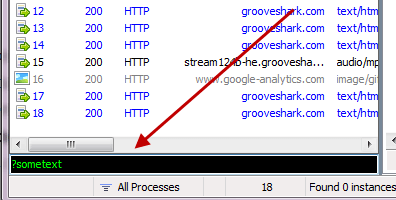QuickExec Reference
Using QuickExec
Fiddler Classic's QuickExec box allows you to launch script-commands quickly.

Keyboard Shortcuts
- Hit ALT+Q to quickly set focus to the QuickExec box. If Fiddler Classic isn't active, hit CTRL+ALT+F first to activate Fiddler.
- In the QuickExec box, hit CTRL+I to insert the URL of the currently selected session in the session list.
Default commands
?sometext
As you type sometext, Fiddler Classic will highlight sessions where the URL contains sometext. Hit Enter to set focus to the selected matches.
?searchtext
>size
Select sessions where response size is greater than size bytes.
>40000 <-- Select responses over 40kb
Also:
<size
Select sessions where response size is less than size bytes.
<5k <-- Select responses under 5kb
=status
=method
Select sessions where response status = status or request method = method.
=301 <-- Select 301 redirect responses
=POST <-- Select POST requests
@host
Select sessions where the request host contains host. Hit Enter to set focus to the selected matches.
@msn.com <-- Select www.msn.com, login.msn.com, etc
bold
Mark any future sessions in bold if the url contains the target string
bold /bar.aspx
bold <-- Call with no parameter to clear
bpafter
Break any response where the RequestURI contains the specified string
bpafter /favicon.ico
bpafter <-- Call with no parameter to clear
bps
Break any response where the status code matches
bps 404
bps <-- Call with no parameter to clear
bpv or bpm
Create a request breakpoint for the specified HTTP method. Setting this command will clear any previous value for the command; calling it with no parameter will disable the breakpoint.
bpv POST
bpv <-- Call with no parameter to clear
bpu
Create a request breakpoint for URIs containing the specified string. Setting this command will clear any previous value for the command; calling it with no parameter will disable the breakpoint.
bpu /myservice.asmx
bpu <-- Call with no parameter to clear
cls or clear
clear the session list
cls
dump
dump all sessions to a zip archive in C:\
dump
g or go
Resume all breakpointed sessions
g
help
Show this page
help
hide Hide Fiddler in System tray
hide
urlreplace
Replace any string in URLs with a different string. Setting this command will clear any previous value for the command; calling it with no parameter will cancel the replacement.
urlreplace SeekStr ReplaceWithStr
urlreplace <-- Call with no parameters to clear
start
Register as the system proxy
start
stop
Unregister as the system proxy
stop
show
Restore Fiddler Classic from system tray -- more useful when triggering rules from ExecAction.exe (see below)
show
select *MIME*
Select any session where the response Content-Type header contains the specified string.
select image
select css
select htm
select *HeaderOrFlag PartialValue*
Select any session where the named Header or SessionFlag contains the specified string.
select ui-comments slow
select ui-bold * <-- unless preceded by a slash, * means any value
select ui-comments \* <-- Find comments with a *
select @Request.Accept html <-- Find requests with Accept: html
select @Response.Set-Cookie domain <- Find responses that Set-Cookie on a domain
allbut or keeponly
Hide all sessions except those where Content-Type header contains the specified string.
allbut xml
allbut java
quit
Shutdown Fiddler.
quit
!dns hostname
Perform a DNS lookup of the target host and show the results on the LOG tab
!dns www.example.com
!nslookup www.example.com
!listen *PORT [CERTHOSTNAME]*
Set up an additional listener on another port, optionally secured by a HTTPS certificate
!listen 8889
!listen 4443 localhost
!listen 444 secure.example.com